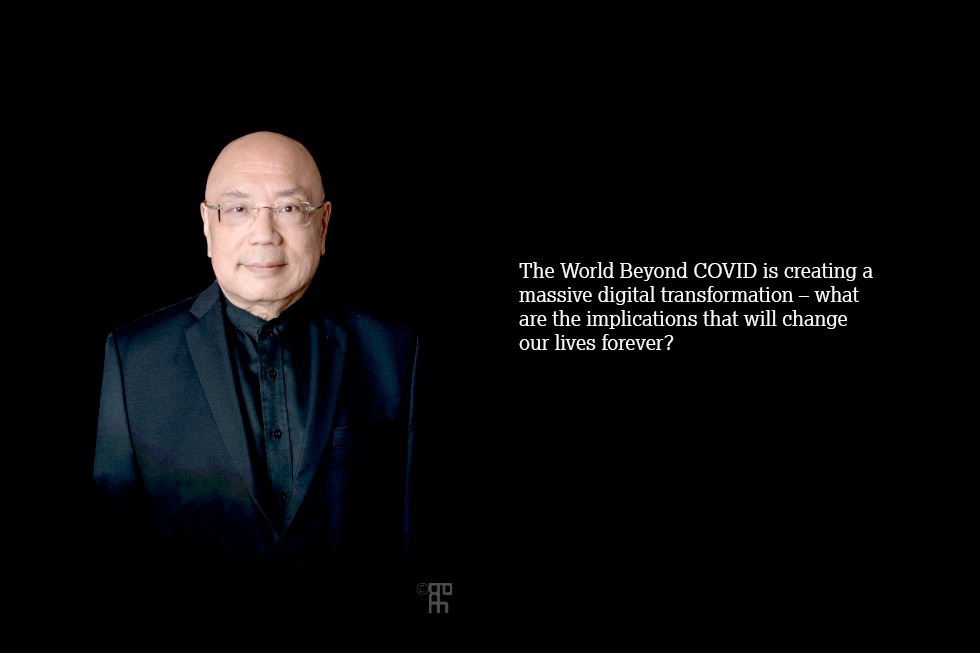He teaches governments and leaders to use AI to create a better world
– and business
30. marts 2021
By EVA ANDERSEN
STEPHEN IBARAKI is one of the world’s most influential experts within AI and has received more than 300 global innovation awards and recognitions of his work.
Canadian Ibaraki has been awarded the prestigious Microsoft award ‘Most Valuable Professional’ not less than 15 times.
Stephen Ibaraki is Serial and Social Entrepreneur, Futurist, Venture Capitalist – Chair REDDS Capital, Founder chair outreach UN ITU AI for good purposes global summit which is THE leading action-oriented, global & inclusive United Nations platform on AI.
At the VL Summit 2021 (Thursday 6th of May), Stephen Ibaraki will talk about technology-driven 5th Machine Age transformation trends and inspire about how AI and disruptive innovations can drive business solutions to grow economies, business growth and support ESG goals such as for the world’s serious climate, humanitarian and health challenges across the 17 UN Global Goals.
VL News caught him on a Zoom call and asked him about what he thought would be the major advancements in the digital transformation in the coming years. And about how businesses should prepare themselves.
The next ten years more changes will occur than the past 10,000 years. They will have an impact on everyone. Not only on technologies and jobs, but on cultures, societies, governments, how we think, how our children grow up – all aspects of our lives will change
Stephen Ibaraki: The world is in a historical inflection point
Which technological advancements will be the most important in the years to come?
-The next ten years more changes will occur than the past 10,000 years. They will have an impact on everyone. Not only on technologies and jobs, but on cultures, societies, governments, how we think, how our children grow up – all aspects of our lives will change.
The major advancements will be the aggregation of the confluence of Internet of Things, 5G/6G to cloud computing, artificial intelligence, machine learning, robotics, new 3D chips and quantum computing. You’ve seen a lot of this in the news, but it’s going to accelerate, which means that businesses have to plan for the implications of edge computing, the digitalization of the workforce, of your consumers, of your interaction with the government, with other businesses and so on. If you don’t, you won’t survive.
-The development of the vaccine against Covid has occurred within a year – it would normally have taken 10 years.
-In 2021 the time frame for radical change of the digital transformation has been tightened severely due to Covid. A good example is healthcare which now can be done remotely.
When the UN Millennium Development Goals were presented in 2000 it was not anticipated how mobile technology and cloud computing would change the world and how everyone would use the internet as they do today, he explains. I am advising, writing, teaching, speaking, creating innovations on this since the 1970s—creating my first computer when I was ten. Even then, I was advocating on the implications of technology revolutions and AI and its usage for good purposes.
This was, however, addressed in the 17 Sustainable Development Goals – or the SDG’s as they are called.
-I was asked to provide input to the UN when the SDG’s were being formed, and I indicated that the implications of technology had to be incorporated, as technology drives everything today including AI for good and peaceful purposes.
If you’re a business, if you’re at the UN, you cannot address poverty without the implications of using satellite technology for food supplies and food security.
-You need artificial intelligence to make sense of the massive amounts of data.
-How can you educate without technology?
-How can you secure plain water without technology?
-All of the SDGs require some application of technology either to provide increased awareness or to provide more data which can address how to directly solve the problems of the world. In fact, that’s how UN ITU AI for good purposes global summit was founded. We have these technologies, but how do we address them? How do we use them to accelerate and to ensure inclusion and diversity and to adopt the 17 sustainable development goals?
-Set up innovation centers within your companies to look at the implications of 5G, cybersecurity, the Internet of Things, cloud computing, blockchain, machine learning / artificial intelligence, depending on the industry.
What advice would you like to give to the Danish business leaders in order to be prepared for the digital transformation?
-Set up innovation centers within your companies to look at the implications of 5G, cybersecurity, the Internet of Things, cloud computing, blockchain, machine learning / artificial intelligence, depending on the industry.
-World Economic Forum, in 2020, has actually produced a list of more than 15 major technologies you should be planning for, and what the adoption rate will be by 2025; earlier in 2018, they did a forecast by 2022.
-So you definitely have to plan for that by forming groups within your companies to look at how you can take those technologies to help improve your operations or different aspects of your business.
-You have to take a programmatic approach to do that, and not wait. Don’t wait as the phone companies waited. Apple came, and they were unprepared. Or look at Tesla with a market value bigger than General Motors and Ford.
-You have to think about the labor and the skills issue. How are you going to address talent, attract talent, maintain talent, grow talent? Work with the education systems around your companies as well and as a community, to make sure that the educational system is in gear for your talent needs in line with society 5.0, the smart humanity, the fourth industrial revolution, they’re there.
-Be prepared and make sure that you have sufficient resources to address all these challenges and possibilities. Don’t wait.

